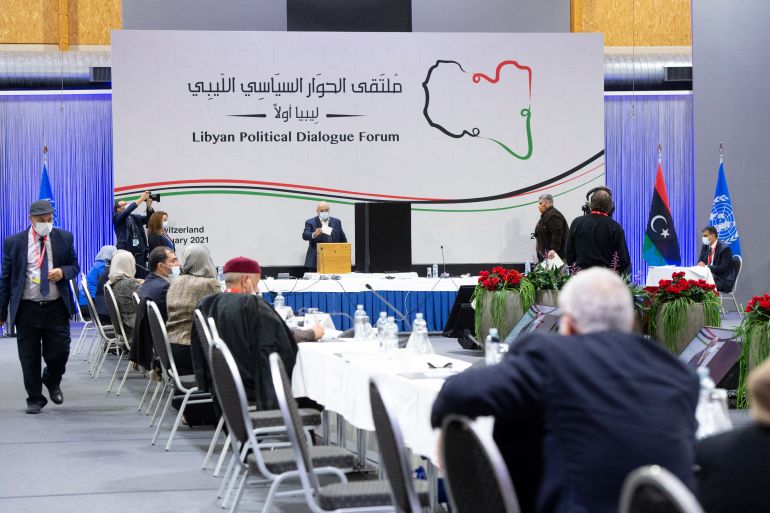Libya’s new interim leader holds talks in Benghazi
Mohammad Younes Menfi arrives in key eastern city for talks with politicians, tribal leaders and activists.

The president of Libya’s newly elected interim government has met with dozens of tribal elders, academics and activists in the eastern city of Benghazi, the stronghold of the divided country’s eastern factions, as part of a campaign to foster unity ahead of national elections in December.
Mohammad Younes Menfi, chairman of Libya’s Presidential Council, arrived from Athens on Thursday where he had been living for the past three years.
Keep reading
list of 3 itemsUN-led Libya forum selects new interim government
Ocean Viking ship rescues hundreds of migrants off Libya coast
His visit follows a United Nations-sponsored conference last week in which delegates from Libya’s warring sides picked four leaders to guide the nation ahead of the December elections.
The election of the presidential council was a major – if uncertain – step towards unifying the country and ending one of the intractable conflicts left behind by the Arab Spring.
Libya has endured almost a decade of fighting since the 2011 NATO-backed uprising that toppled and killed longtime leader Muammar Gaddafi.
Since 2015, the North African country, a major oil producer, has been divided between two governments, one in the east and another in the west, each backed by a vast array of militias.
In April 2019, Khalifa Haftar, a renegade military commander allied with the eastern government, launched an offensive to seize the capital, Tripoli.
His campaign failed after 14 months of fighting and last October, the UN convinced both parties to sign a ceasefire agreement and embark on a political dialogue.
Menfi, a diplomat from the country’s east, was picked to head the Presidential Council, which includes two other officials. The forum also chose Abdul Hamid Dbeibah, a powerful businessman from the western city of Misrata, as interim prime minister.
Each member of the three-man council represents a region of old Libya: Tripolitania in the west, Cyrenaica in the east, and Fezzan in the southwest.
The appointment of an interim government capped months of UN-brokered talks that resulted in an agreement to hold elections on December 24.
“Our objective is to achieve unity and true reconciliation and to collaborate with all in order to end the suffering,” Menfi tweeted shortly before his arrival. Shortly after leaving the airport, he met with Haftar at his forces’ headquarters in the village of Rajma, 27 kilometres (17 miles) east of Benghazi.
During the meeting, Haftar reiterated his backing of the new transitional authorities and his support for a “peaceful and democratic alternation of power” in Libya, according to a statement released by his office.
Haftar had already welcomed the appointment of the new government, hailing its leaders as “national figures.” Although Menfi comes originally from the eastern city of Tobruk, some observers argued that he is politically allied to western factions, which may undermine the transitional authorities’ ability to represent the political interests of the east.
Menfi had served for almost a year as Libya’s ambassador in Greece before Athens ordered his expulsion in December 2019, following a controversial maritime agreement between Tripoli and Ankara. He remained in Greece with his family but without diplomatic status.